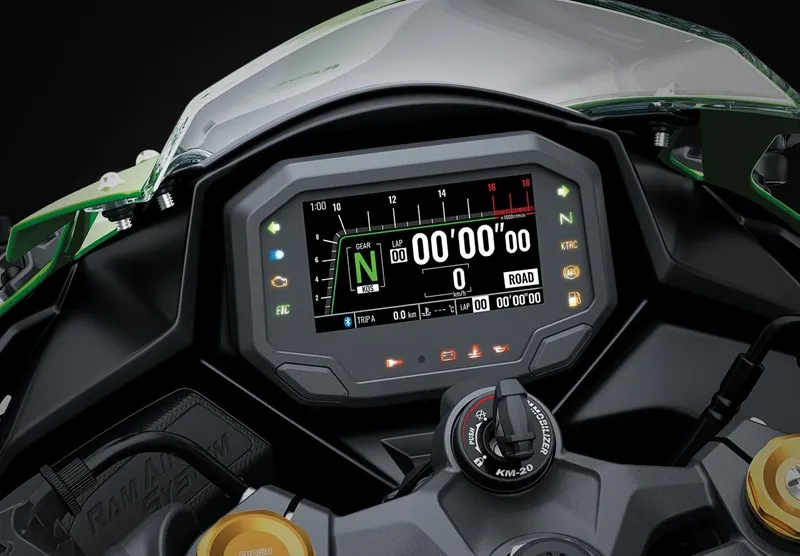Kawasaki unleashes ZX-4R: Ninja 400 sibling with different DNA
Kawasaki ZX-4R is a more track-focused sport bike as compared to Ninja 400, with a similar displacement and styling.
Kawasaki, distinguished in making some of the finest sports bikes, has unveiled a new 400cc race machine. The Japanese brand has brought out the new Ninja ZX-4R lineup that packs a completely different powertrain and underpinnings from the entry-level Ninja 400.
In the US market, prices for the ZX-4R start at $9,699 (equivalent to Rs 7.95 lakh), and the super-sport bike is available in three variants—standard, SE, and RR. The new ZX-4R range is meant to bridge the gap between Ninja ZX-25R and Ninja ZX-6R.
Styling
Design-wise, the ZX-4R resembles its other siblings from the Ninja range of sport bikes, with attributes like a fully-faired front section, twin LED headlights, triangular LED taillight, a compact windscreen with smoked effect, sculpted fuel tank, a low-set clip-on handlebar, a side-slung exhaust muffler, and step-up split seat design.

Kawasaki Ninja ZX-4R
It is distinguished from the rest of the Ninjas by the snazzier body graphics of Kawasaki’s racing team, available in the top two variants. Hence, it is popularly known as the KRT Edition. The base variant wears the signature Lime Green paint scheme as standard.
Features on offer
Like other sportier Ninjas from the ZX lineup, the ZX-4R is packed to the brim with features, including a 4.3-inch fully-digital colour LCD instrument panel equipped with Bluetooth connectivity that offers GPS navigation. Kawasaki’s RIDEOLOGY application can be used to connect to the rider’s smartphone to obtain a variety of vehicle riding information.

fully-digital TFT instrument console on ZX-4R
In addition, Ninja ZX-4R boasts a full suite of rider electronics, including a three-level traction control system, power modes, four riding modes—Sport, Road, Rain (all preset), and Rider (fully customisable), and an optional bi-directional quickshifter enabling clutchless shifting up/down. A USB charging port is standard in all three variants.
Powertrain specs
At the heart of ZX-4RR is an all-new 399cc, liquid-cooled, DOHC, 16-valve inline four-cylinder motor that pumps out 77 hp without ram air intake and 80 hp with ram air intake. Peak torque output stands at 35.9 Nm, which comes in at 11,000 rpm. This engine can rev up to 15,000 rpm, which signifies its free-revving nature.

ZX-4R powered by a 399cc inline-four
The ram air intake system works to improve cylinder-filling efficiency, which, in turn, helps achieve optimal engine performance. Transmission duties are carried out by a six-speed gearbox paired with a slip-and-assist clutch enabling smooth gear shifts.
Although performance figures haven’t been revealed by the Japanese bikemaker yet, it gets a long silencer pipe that produces a traditional inline-four symphony, lending the bike true supersport characteristics.
Hardware specs
Underpinning the ZX-4R is a trellis frame made of high tensile steel, suspended on 37mm upside-down forks at the front and a monoshock at the rear. The top-spec RR trim utilises more premium Showa's BFRC-lite components, adjusted for compression, rebound, and spring preload at the rear and preload at the front.

Kawasaki Ninja ZX-4R highlights
Kawasaki's modern classic motorcycle W175 its most affordable at Rs 1.47 lakh
The motorcycle rolls on 17-inch wheels wrapped around by Dunlop Sportmax tyres with sizes 120/70-ZR17 (front) and 160/60-ZR17 (rear). Braking power is achieved via 290 mm semi-floating front twin discs and radial-mounted monobloc callipers, while the rear uses a large-diameter 220mm disc. The braking hardware is complemented by dual-channel ABS as standard.
(Images courtesy: Kawasaki)
Edited by Megha Reddy







